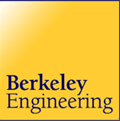 |

Bart Nagel photo
In His Own Words
What is it about Berkeley that makes it so special and unique?
Dean Newton: Like every university, Berkeley has a personality, and
part of our Berkeley personality is our diversity.
I use that term very, very broadly. Economic, social, cultural, educational,
and ethnic—the richness of the programs that we have here, the
importance of the arts and humanities, for example, to a Berkeley
education—this kind of diversity is critical to the sort of person
that emerges from the Berkeley education process.
It goes beyond the bounds of the campus into the city.
The richness
of the culture we have here is something that many of us take for
granted, but it is absolutely unique in the world. And in my view,
along with the sheer strength of our academic programs, this is a
large part of why we are who we are, why our students are valued so
much, and why students feel such a strong tie to both the College
and the University.
|
 |
About Dean A. Richard Newton
A. Richard Newton is the Dean of the College of Engineering and the Roy W. Carlson Professor of Engineering at the University of California, Berkeley. A dedicated educator, researcher, and businessman, Newton's pioneering methodologies and technologies for circuit design and electronic systems architecture are internationally recognized. As dean, Newton is passionate about employing technology to tackle tough societal problems and about educating the next-generation of engineers to develop those technologies.
Newton has received numerous awards for his research endeavors. In 2004 he was named to the National Academy of Engineering and in 2003 won the Phil Kaufman Award, the highest recognition of the EDA Consortium.
Newton began his career as a student at the University of Melbourne in Australia, where he developed one of the first interactive versions of the SPICE circuit simulator in 1971, using an ASR33 teletype. He continued his work in circuit simulation at Berkeley earning his PhD in 1978 in the Electrical Engineering & Computer Sciences (EECS) department and joining the faculty the following year. Eight years later, he was honored as the national recipient of the C. Holmes McDonald Outstanding Young Professor Award of the Eta-Kappa-Nu Engineering Honor Society. He served as chair of EECS before becoming dean. He was the founding Director of the MARCO/DARPA Gigascale Silicon Research Center for Design and Test from 1998-2002. His teaching and research interests include all aspects of the design of electronic systems and the application of information and communication technologies (ICT) to the solution of societal problems.
Newton also led the establishment of the Center for Information Technology Research in the Interest of Society (CITRIS), a partnership between UC Berkeley, Davis, Merced, and Santa Cruz. The CITRIS goal is to meet California's urgent needs, from healthcare to energy to homeland defense.
A trusted adviser in the commercialization of emerging technology, Newton is also a member of the board of directors of Crossbow, Synopsys, and Tensilica. During the 1980s, he was a cofounder of SDA Systems (now Cadence Design Systems) and Synopsys. He serves on the technology council of ST Microelectronics as well as the technical advisory boards of Form Factor, Lightspeed Semiconductor, Pharmix, Sonics, Woodside Networks, and the Microsoft Research Laboratories.
Newton is known in the venture capital community for his work with the Mayfield Fund, a prestigious venture capital partnership focused on high-technology. A venture partner with the Mayfield Fund, Newton has contributed to the evaluation and early-stage development of more than two-dozen new companies including Silicon Light Machines where he acted as president and CEO during 1994 and 1995 — while still teaching digital logic design to an undergraduate class of over 180 students. He has also played a key role in the formation of a number of successful companies, including Synopsys, Inc., SDA, PIE Design Systems and Simplex Solutions (now part of Cadence) among others. |
 |
"The richness of the culture at Berkeley
is something that many of us take for granted, but it is absolutely
unique in the world."
— Dean Richard Newton
 |
 |
 |
 |
 |

A History of Leadership
Learn about the deans that have shaped Berkeley Engineering
in the Dean's
Gallery.
|
 |
 |
 |
 |
 |
|
 |

